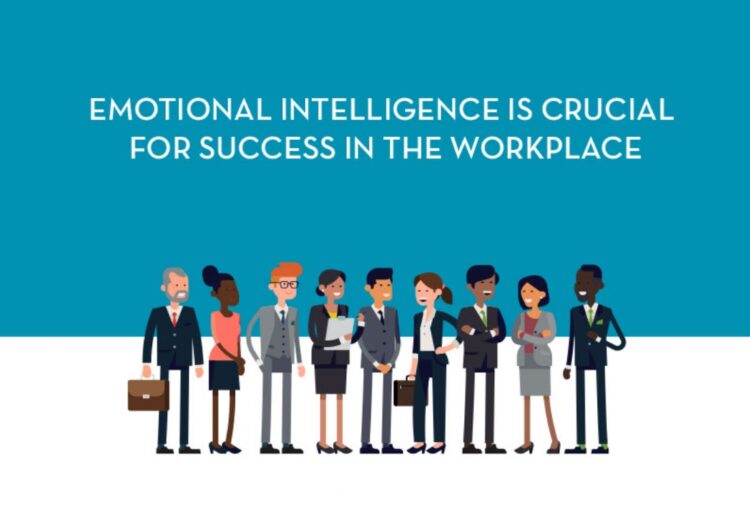Last Updated on September 28, 2022 by Editors Desk
Main highlights:
- What is Emotional intelligence?
- What is meant by emotional intelligence in the workplace?
- Why is Ei needed in the workplace?
Emotional intelligence in the workplace can provide significant benefits and further develop your career, in addition to creating better relationships and promoting a positive work environment. Emotional intelligence is important because it can help you improve your interpersonal relationships, both personally and professionally.
The workplace includes being able to understand nonverbal cues better, properly adjust your behaviour, make good decisions, and become a respected leader. If you are emotionally intelligent, you can handle interpersonal relationships empathetically, and high emotional intelligence can help you better achieve your professional goals.
Emotional intelligence is essential at work so you can perceive, reason with, understand and
manage the emotions of yourself and others. Being able to handle emotions gives you the
ability to guide and help people, and it can help you be happier and more successful. A few
reasons why emotional intelligence is vital in the workplace include :
1. Be self-aware of personal emotions:
You can use this skill to adjust your behaviour before it becomes an issue for a client or coworker. For example, if you know you had a rough night, you might attempt to change your behaviour the following workday by shifting your focus toward more positive feelings.
2. Improve efficiencies:
When you are empathetic and understanding of other people’s emotions, you can make decisions with ease and complete tasks more efficiently. Having emotional intelligence helps you to create a healthy environment and maintain workplace ethics.
3. Further your career:
Emotional intelligence and career go hand in hand. Actively displaying abilities such as patience, active listening, positivity and empathy can help you advance. Understand: You have the chance to fix a situation before it becomes a problem.
For example, if you notice a coworker displaying some nonverbal signs of sadness, you might
take it and help him/her resolve the issue.
4. Encourage others to develop strong interpersonal skills:
Emotions are contagious, and displaying explicit motivation, empathy, responsibility and teamwork could encourage your team to follow along.

The importance of emotional intelligence in the workplace should not be underestimated. As you
can deduce from the list of competencies above, possessing any of these EI skills would positively
impact the professional career of employees at any level—from being a better communicator to a
more productive worker to a stronger leader.
Additionally, with the continuous increase of globalization in many businesses, emotional
intelligence plays an even more significant role at work, multicultural teams must learn to
effectively understand each other, express their thoughts and opinions, and adapt to each others’
differences.
Similarly, employees also have to navigate increasingly complex interactions with clients, colleagues, and associates from around the world. As such, having the emotional capacity to empathize, engage, and work with those from other social groups will enhance business performance and effectiveness in these cross-cultural situations.
Emotional intelligence in the workplace begins from the inside out with each individual. It involves recognizing various aspects of your feelings and emotions and taking the time to work on the elements of self-awareness, self-regulation, motivation, empathy and social self-awareness.
The online degree gives you the tools to help you measure and analyze your emotional intelligence levels. You will also learn strategies for improving your level of emotional intelligence throughout the different stages of your professional development. Emotional intelligence is the ability to identify and regulate one’s emotions and understand the emotions the others.

A high EQ helps you to build relationships, reduce team stress, defuse conflict and improve job satisfaction. Ultimately, a high EI means having the potential to increase team productivity and staff retention. That’s why when it comes to recruiting management roles, (emotional quotient) – rather than IQ (intelligence quotient). EI is important for everyone who wants to be career ready.
Drawing on the work of Daniel Goleman, below are five pillars of emotional intelligence and how they give you an advantage in the workforce. Self-awareness is the ability to recognise one’s emotions, emotional triggers, strengths, weaknesses, motivations, values and goals and understand how these affect one’s thoughts and behaviour.
If you’re feeling stressed, annoyed, uninspired or deflated in your role, for example, it’s important to take the time to check in with yourself and investigate why you might be feeling this way. When you’re able to label the emotion and understand its cause, you’re in a much better place to address the issue with appropriate action, such as putting your hand up to take on additional work that might inspire you or finding productive ways to deal with a difficult colleague.
Motivation is essentially what moves us to take action. When we face setbacks and obstacles, checking in with our motives is what inspires us to keep pushing forward.
Those with low motivation are more likely to be risk-averse (rather than problem-solvers), anxious and quick to throw in the towel. Their lack of motivation may also lead them to express negative feelings about project goals and duties.



